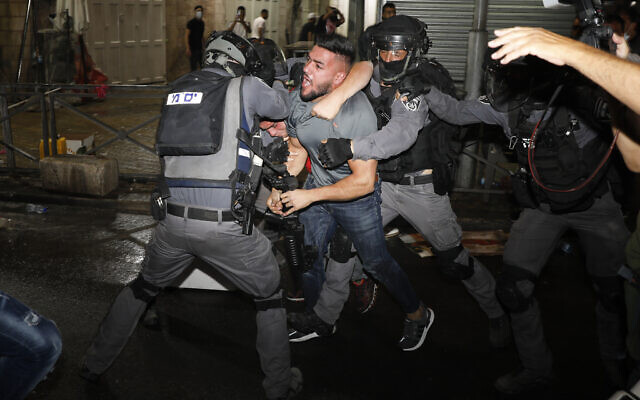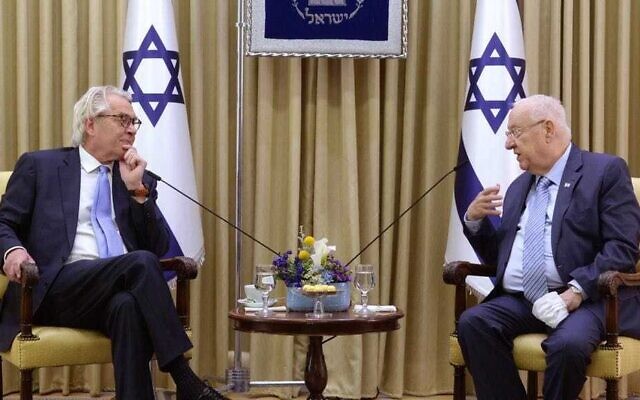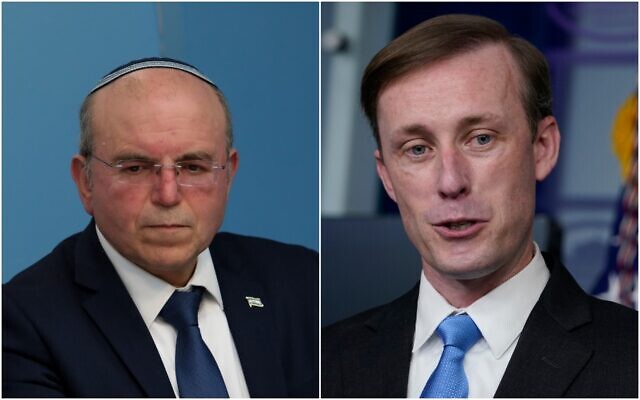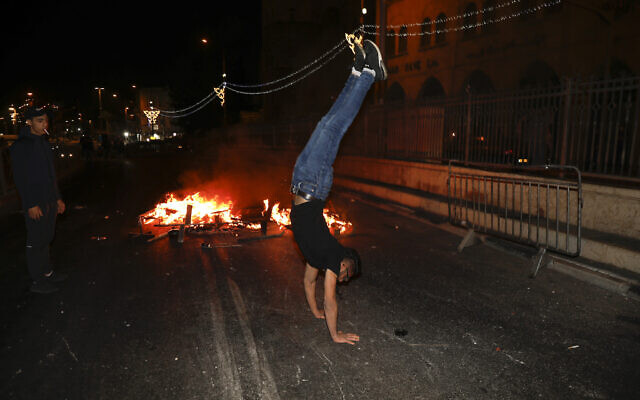US national security adviser calls Israeli counterpart to express Washington’s ‘serious concerns’ about the violence in city and urges Israel to ‘ensure calm’ on Jerusalem Day

NEW YORK — The UN Security Council will convene an emergency session on Monday morning to discuss the escalating violence in Jerusalem, including major clashes on the Temple Mount.
The session will be held hours before a scheduled annual march of thousands of Jewish nationalists through the Old City in what some security officials fear may cause the situation, already tense over the impending eviction of 4 Palestinian families from an East Jerusalem neighborhood, to boil over.
The closed-door session will convene following a request from Tunisia, three security council diplomats told The Times of Israel. Such unscheduled meetings are not entirely rare, and the 15-member body has met under such circumstances several times this year to discuss escalations in Myanmar and Ethiopia.
However, Monday’s session is not likely to result in any type of resolution or joint statement, two of the diplomats speculated, noting that the council’s members have entrenched and often opposing views on the Israeli-Palestinian conflict that make consensus-building difficult.
The 9 a.m. session will feature a briefing from the UN’s Special Coordinator for the Middle East Peace Process Tor Wennesland. In January, the Norwegian diplomat replaced Nikolay Mladenov who was praised by both Israelis and Palestinians for his diplomatic efforts to maintain calm in the region.

Ahead of the meeting, UN Secretary-General António Guterres called for Israel to “cease demolitions and evictions, in line with its obligations under international humanitarian and international human rights law” and exercise “maximum restraint” in dealing with protests.
Separately on Sunday, US National Security Adviser Jake Sullivan held a phone call with his Israeli counterpart Meir Ben Shabbat to discuss Washington’s “serious concerns about the situation in Jerusalem, including violent confrontations at the Haram al-Sharif/Temple Mount during the last days of Ramadan,” according to a White House readout.
Without giving details, Sullivan noted recent engagement by senior US officials with Israeli and Palestinian counterparts along with key regional stakeholders in an effort to restore calm, the readout said.
Sullivan “also reiterated the United States’ serious concerns about the potential evictions of Palestinian families from their homes in the Sheikh Jarrah neighborhood,” the statement said, referring to an issue that has sparked mass protests in East Jerusalem over the past week.
The sides “agreed that the launching of rocket attacks and incendiary balloons from Gaza towards Israel is unacceptable and must be condemned,” the readout said. the Hamas terror group has resumed attacks on Israel in support of the Palestinians clashing in Jerusalem
Sullivan encouraged the Ben Shabbat “to pursue appropriate measures to ensure calm during Jerusalem Day commemorations,” in an apparent reference to Monday’s scheduled “Flag March.”

Biden’s national security adviser went on to express the US “commitment to Israel’s security and to supporting peace and stability throughout the Middle East, and assured Mr. Ben-Shabbat that the US will remain fully engaged in the days ahead to promote calm in Jerusalem.”
Israeli police faced off with Palestinian protesters Sunday in another night of clashes in East Jerusalem, a day before Jewish nationalists planned to parade through the Old City in an annual Jerusalem Day flag-waving display meant to cement Israeli claims to the city.
Police chief Kobi Shabtai said Sunday that he was working to ensure the flag march would be able to take place as planned.
However, police were slated to hold an additional situational assessment on Monday morning when a final decision would be made on whether to allow or reroute the flag march.
But Shabtai gave the initial go-ahead despite days of unrest and soaring Israeli-Palestinian tensions at a flashpoint holy site and in a nearby Arab neighborhood where Jewish ultranationalists are trying to evict dozens of Palestinians from their homes.

Addressing a special cabinet meeting ahead of Jerusalem Day, Prime Minister Benjamin Netanyahu said Sunday that Israel “will not allow any extremists to destabilize the calm in Jerusalem. We will enforce law and order decisively and responsibly.”
“We will continue to maintain freedom of worship for all faiths, but we will not allow violent disturbances,” he said. At the same time, he said, “We emphatically reject the pressures not to build in Jerusalem.”
Jerusalem Day is meant to celebrate Israel’s capture of East Jerusalem, home to the Old City and its sensitive holy sites, in the 1967 Mideast war. But the annual event is widely perceived as provocative, as hardline nationalist Israelis, guarded by police, march through the Damascus Gate of the Old City and through the Muslim Quarter to the Western Wall, the holiest site where Jews can pray.
This year the march coincides with the Muslim holy month of Ramadan, a time of heightened religious sensitivities, and follows weeks of clashes. That, combined with Palestinian anger over the eviction plan in the nearby Sheikh Jarrah neighborhood, could set the stage for an especially volatile day.
Amos Gilad, a former senior defense official, told Army Radio that the parade should be canceled or at least kept away from Damascus Gate, saying “the powder keg is burning and can explode at any time.” Israel’s public broadcaster Kan said the final route of the parade had not yet been decided.
As reported by The Times of Israel
